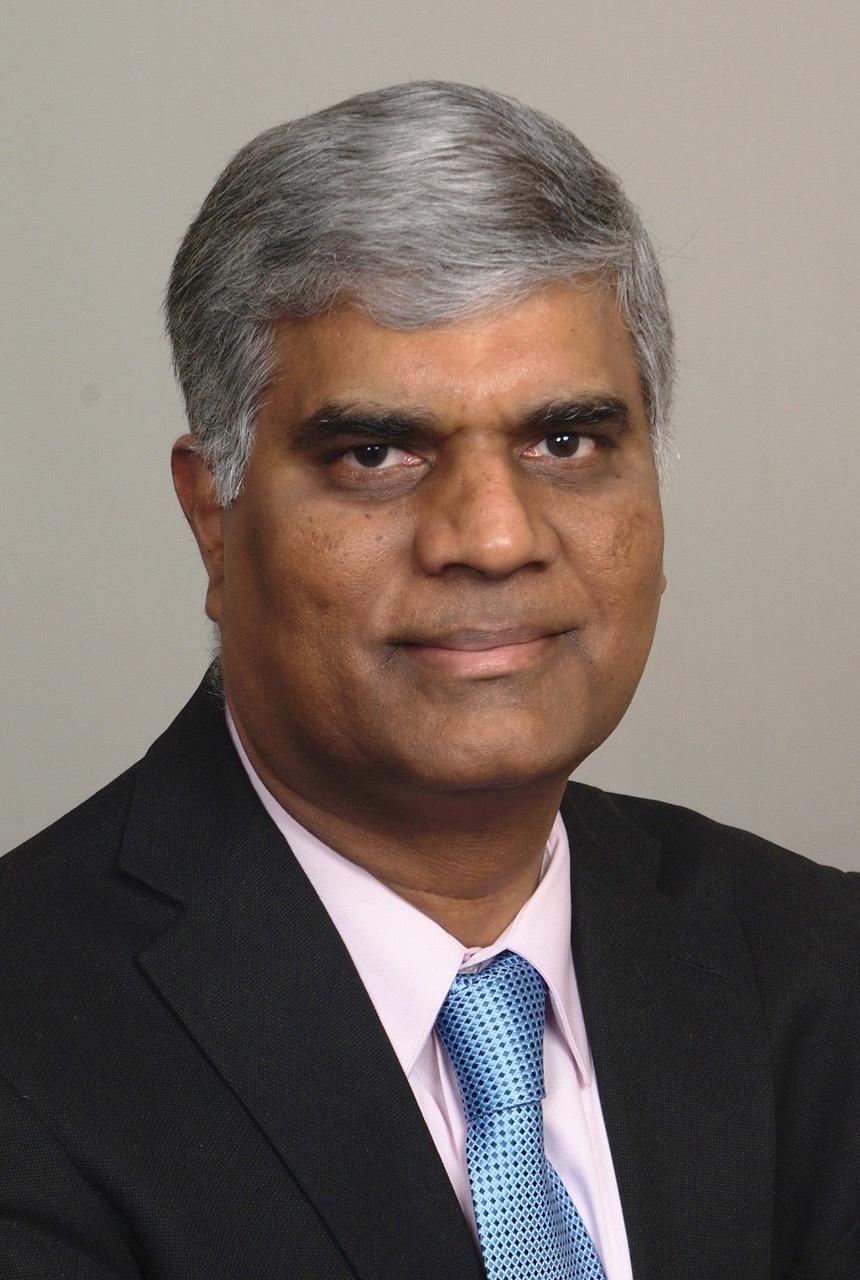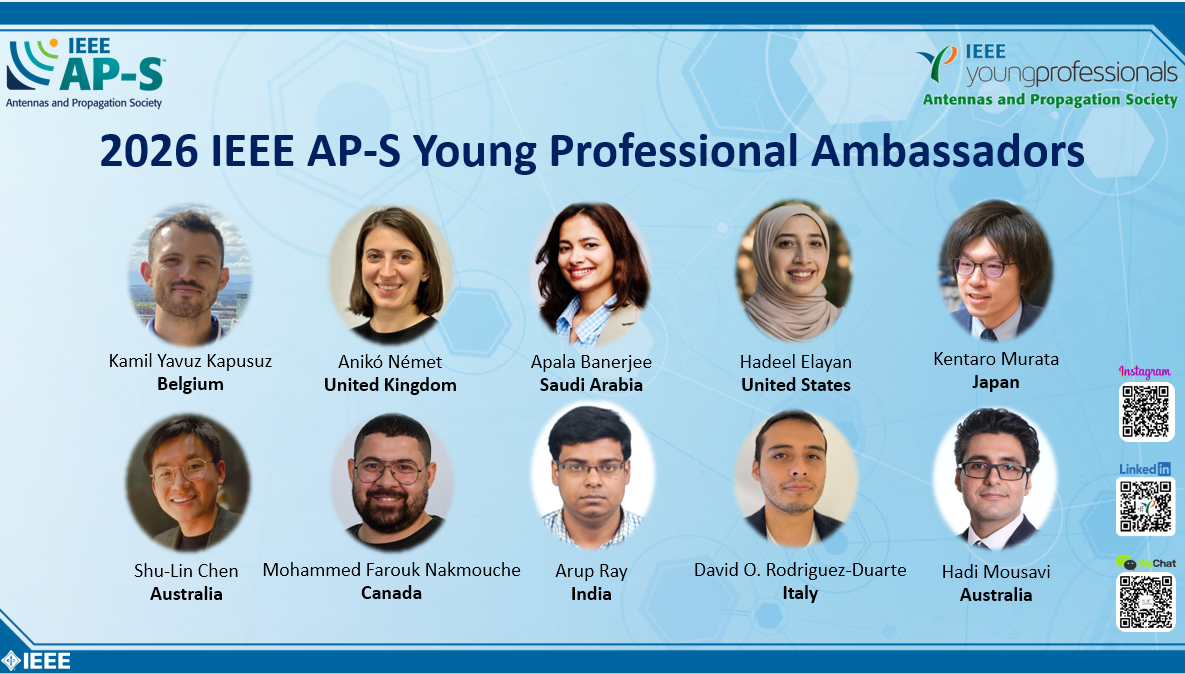
IEEE Antennas Propagation Society – Advancing Electromagnetics Frontiers!
C. J. Reddy
President, IEEE Antennas and Propagation Society
January 2026First, I would like to wish you all a very Happy New Year 2026!! As we begin the new year, I am honored and humbled to be serving as the 2026 President of the IEEE Antennas and Propagation Society (AP-S)!! This is a great time for AP-S as one of the fastest growing societies of IEEE. As of now, AP-S just crossed 16,000 members. I am grateful to the AP-S membership entrusting me with this responsibility of leading the Society. I also would like to thank our outgoing President, Prof. Christophe Fumeaux, who made me part of every aspect of the society’s operations in 2025 as I prepare to take on the duties of the President in 2026. I will be relying heavily on the guidance of Prof. Christophe Fumeaux as well as our past presidents, Prof. Branislav Notaroš, Prof. Stefano Maci, Prof. Gianluca Lazzi and Prof. Yahya Antar.

My long journey with IEEE started as a student member when I was an undergraduate student at Regional Engineering College, Warangal, India (now National Institute of Technology, Warangal) and later as a Graduate Student member at Indian Institute of Technology, Kharagpur, India. In 2026, I will be completing 36 years of my IEEE membership with most of it as a member of AP-S!! Over the years I had the opportunity to volunteer as reviewer and Associate Editor of multiple AP-S publications as well as Chair of the AP-S Young Professionals Committee and the AdCom member. It has been an exciting journey from being a student member to the President of AP-S!!
From humble beginning of 1949, AP-S has grown into a vibrant, diverse network of researchers, engineers, educators, and students. The rapid expansion of technologies like 5G/6G, the Internet of Things, artificial intelligence, and sustainable energy solutions underscores the importance of our discipline. It is crucial that we continue to lead, inspire, and support the next generation of innovators. I am happy to say, AP-S is in a great place to lead and address these challenges. AP-S is grateful to have dedicated volunteers who spend countless hours of their time leading various activities. Please join me in welcoming our new President-Elect, Prof. Francesco Andriulli as well as the newly elected AdCom members, Dr. Charlotte Blair, Prof. Vladimir Okhmatovski, Prof. Francisco Pizarro Torres and Prof. Ying Liu. I look forward to working with them as well as the other AdCom members, Prof. Buon Kiong (Vincent) Lau, Prof. Kamal Sarabandi, Prof. Eva Rajo-Iglesias, Dr. Surendra Pal, Prof. Giacomo Oliveri, Prof. Jessica Ruyle, Prof. Satish Sharma and Prof. Wonbin Hong. I would like to thank our outgoing AdCom members, Dr. Sima Noghanian, Dr. Camila Albuquerque, Prof. Zhi Ning Chen and Prof. Atif Shamim for their contributions and service to society.

In 2025, under the leadership of Prof. Christophe Fumeaux, AP-S has seen changes in its operations with Vice Presidents in place as well as Director of Inter Society Coordinator (DISC). These positions were originally conceived by Prof. Prof. Branislav Notaroš during his term (2024) and implemented in 2025. Vice President positions are created for coordination among various standing committees (AP-S has 24 of them !!) for coherent operation of the society. DISC position is created to have a single point of contact as we collaborate with various sister societies inside and outside of IEEE. I look forward to working with the Vice Presidents and DISC in 2026 to make sure we strengthen our operations and enhance our collaborations with sister societies and associations.
Another major activity in 2025 is establishment of 12 Technical Committees (TCs) under the Technical Directions Committee. Seven of them address the key technical fields of AP-S and rest of the five address applications relevant to AP-S. TCs also play critical roles in shaping the technical program at our flagship conference. I look forward to working closely with the Technical Directions Committee as well as the TCs to enhance AP-S position in our field of interest.
By this time, you read this article, we will be preparing for the 2nd Edition of Latin American Conference on Antennas and Propagation (LACAP 2026) in Natal, Brazil during February 22-25, 2026. LACAP 2026 is shaping up to be a great conference with more than 170 papers submitted. The first of the 2026 AP-S AdCom meetings will be held in Natal, Brazil during the weekend before LACAP 2026. Prof. Branislav Notaroš is leading a special session of talks by the AdCom members on the first day of the conference. AP-S Chapter Activities Committee led by Dr. Ajay Poddar will be conducting a Chapter Chairs Meeting during the conference and Dr. Jiang Zhu, Chair of the Industry Initiatives and Listings Committee is organizing a great industry panel during the conference. If you have not already planned to attend LACAP 2026, you may still have time to make your plans. This and future LACAP conferences will be key drivers to enhance and grow AP-S membership in Central and South America.
One of the highlights for AP-S members every year is our flagship conference usually held in July of the year. This year is no exception. 2026 IEEE International Symposium on Antennas & Propagation and USNC-URSI Radio Science Meeting will be held during 12 - 17 July 2026 in Detroit, Michigan, USA. After successful editions of the flagship conference in Italy (2024) and Canada (2025), our flagship conference is back in the USA this year. General Chair of the conference, Prof. Premjeet (Prem) Chahal and Co-Chair, Prof. Amir Mortazawi are working hard to make this conference a memorable one offering an exciting lineup of sessions, workshops, exhibitors, and keynote speakers that will address the latest developments in the broad area of electromagnetics. Detroit is the center of the U.S. automobile industry, and it is a significant hub for automotive research and development, manufacturing, and employment. In addition, Detroit has a rich cultural history, being the birthplace of several influential music genres, including Motown and techno music. It is one of the best conferences to attend to broaden your knowledge, network with experts and peers as well as catch up with your friends and colleagues in the field of antennas and propagation. I have been attending AP-S flagship conferences since 1992 (Chicago) and never missed one so far (except in 2001 in Boston). I enjoy every bit of it and come back from the conference with renewed energy and enthusiasm!! Make plans to attend the 2026 flagship conference in Detroit to experience the energy and excitement!!
I strongly believe that future of AP-S is in good hands with our young professionals and students. To empower the future leaders and innovators, AP-S initiated the Talent Development Fund (TDF) in 2024 under the leadership of Prof. Kamal Sarabandi. IEEE matches the donations dollar for dollar, per IEEE Financial Operations guidelines, enabling AP-S to double its impact. Thanks to the generosity of AP-S members, TDF could establish many programs in a short span of two years. IEEE Leopold B. Felsen Research Grant for Electromagnetics, IEEE AP-S John Volakis Travel Grant for Graduate Students, IEEE Antennas and Propagation Society Acharya Jagadish Chandra Bose Paper Award, IEEE Antennas and Propagation Society Raj Mittra Challenge Award are some of the significant awards to established under the TDF initiative to encourage and benefit young professionals and students. I am also personally invested in the future of our Society by establishing, IEEE AP-S C.J. Reddy Travel Grant for Graduate Students in 2019 through the IEEE Foundation. Now transferring this donation to TDF in 2025, and taking advantage of the matching dollars, we can now offer travel grants to 10 students in 2026 compared to 6 in the past under the IEEE AP-S C.J. Reddy Travel Grant for Graduate Students as well as establish IEEE Antennas and Propagation Society Acharya Jagadish Chandra Bose Paper Award for the best paper by an young professional in the IEEE Antennas and Wireless Propagation Letters. I hope my personal investment in the Society can inspire others to give back so that we can encourage active research and innovation by future generations in the antenna and propagation field. I strongly urge supporting the AP-S Talent Development Fund for the benefit of future generations of engineers in antennas and propagation research and development.

Having served as the chair of the AP-S Young Professionals (YP) Committee (2021-2024), I have a special place in my heart for the young professionals of the Society. With the very successful AP-S YP Ambassador program in its 5th year, we are developing a strong pipeline of future leaders of the Society. I want to take this opportunity to congratulate 2026 IEEE AP-S Young Professional Ambassadors, who will be delivering talks virtually at AP-S Chapters worldwide as well as serving the Society in 2026 and beyond. I encourage all AP-S Chapters across the globe to take advantage of this opportunity to invite AP-S YP Ambassadors to give talks to inspire students and young professionals.

As the AP-S President in 2026, I am expected to participate in various events and conferences to meet as many of our members as possible. I will do my best to do so either in person or virtually. In case, I miss any of the great opportunities to meet you, I apologize in advance.
As we enter 2026, AP-S is celebrating 77 years of technological advancement, transforming the research and application of antennas, electromagnetics and wave propagation across the globe. AP-S has been a beacon of excellence, leading global advancements in antennas, propagation, and electromagnetics. On behalf of the IEEE Antennas and Propagation Society, I extend my deepest gratitude to every member, volunteer, and partner who contributed to this exciting journey of the AP-S. Let us honor our remarkable history as we set our sights on an even brighter future. Happy 77th Anniversary, IEEE AP-S!
The IEEE Antennas and Propagation Society is more than an organization — it is a global family, united by a shared vision of advancing science and improving lives. I am honored to serve as your President and look forward to building a bright, inclusive, and impactful future with you all.
Let us get started!!
C. J. Reddy
2026 President, IEEE Antennas and Propagation Society

